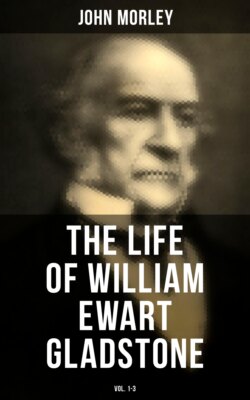Читать книгу The Life of William Ewart Gladstone (Vol. 1-3) - John Morley - Страница 89
На сайте Литреса книга снята с продажи.
FOOTNOTES:
Оглавление207. The Halifax Papers.
208. Among them were such men as Wilson Patten, General Peel, Mr. Corry, Lord Stanhope, Lord Hardinge, most of whom in days to come took their places in conservative administrations.
209. Memo, of 1876.
210. A bill to indemnify the inhabitants of Lower Canada, many of whom had taken part in the rebellion of 1837-8, for the destruction and injury of their property. Mr. Gladstone strongly opposed any compensation being given to Canadian, rebels.—Hansard, June 14, 1849.
211. Hansard, Feb. 21, 1850, p. 1233.
212. Garnett's Edward Gibbon Wakefield, p. 248. See also p. 232.
213. See The Gladstone Colony by J. F. Hogan, M.P., with prefatory note by Mr. Gladstone, April 20, 1897, and the chapter in Lord Sherbrooke's Life, 'Mr. Gladstone's Penal Colony.'
214. Stafford Northcote published an effective vindication in a 'Letter to a Friend,' 1847.
215. Speech on affairs of Lower Canada, Mar. 8, 1837.
216. On Government of Canada bill, May 29, 1840.
217. See his evidence before a Select Committee on Colonial Military Expenditure, June 6, 1861.
218. See speech on Australian Colonies bill, June 26, 1849, Colonial Administration, April 16, 1849, on the Australian Colonies, Feb. 8, 1850, March 22, 1850, and May 13, 1850. On the Kaffir War, April 5, 1852. On the New Zealand Government bill, May 21, 1852. Also speech on Scientific Colonisation before the St. Martin in the Fields Association for the Propagation of the Gospel in Foreign Parts, March 27, 1849.
219. On the Colonial Bishops bill, April 28, 1852.
220. Wakefield was their common teacher. In a letter as secretary of state to Sir George Grey, then governor of New Zealand (March 27), 1846, he states how the signal ability of Wakefield and his devotion to every subject connected with the foundation of colonies has influenced him.
221. To Lord Malmesbury, Aug. 13, 1852. Memoirs of an Ex-Minister, by the Earl of Malmesbury, i. p. 344.
222. 'Should a war take place, I must declare that I should more deplore success on the part of this country than defeat; and though as an English citizen I could not but lament the disasters of my countrymen, still it would be to me a less poignant matter of regret than a success which would offer to the world the disastrous and disgraceful spectacle of a free and mighty nation succeeding by force of arms in putting down and tyrannising over a free though feebler community struggling in defence of its just rights.... That our dominion in America should now be brought to a conclusion, I for one most sincerely desire, but I desire it should terminate in peace and friendship. Great would be the advantages of an amicable separation of the two countries, and great would be the honour this country would reap in consenting to such a step.' Mr. Gladstone spoke the same evening in an opposite sense.—Hans. 39, p. 1466, Dec. 22, 1837. Walpole, Hist. Eng., iii. p. 425.
223. See, for instance, Spectator, Jan. 17, 1845; Times, June 8, 1849. In 1861 it was estimated that colonial military expenditure was between three and four millions a year, about nine-tenths of which was borne by British taxpayers, and one-tenth by colonial contribution.
224. Edward Gibbon Wakefield, p. 331. The reader will find an extract in the Appendix. 'The New Zealand Government bill of 1852, with all its errors and complications, was a grand step in the recovery of our old colonial policy; but perhaps its chief contribution to the re-establishment of constitutional views was Mr. Gladstone's speech on its second reading.'—Right Hon. C. B. Adderley, Review of Earl Grey's Colonial Policy of Lord John Russell's Administration, p. 135.
225. See Mr. Gladstone's speech on introducing the Government of Ireland bill, April 8, 1886.
226. Nov. 12, 1855. See also two speeches of extraordinary fervour and exaltation, one at Mold (Sept. 29, 1856), and the other at Liverpool the same evening, both in support of the claims of societies for foreign missions.
